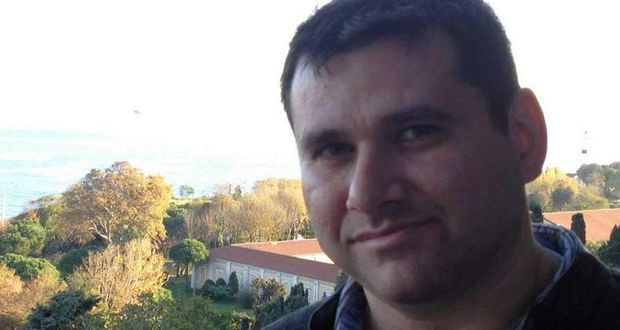
Aboud-Dandachi a Syrian activist and author of the blog “From Homs to Istanbul” talks to CIJnews about the Syrian civil war, on being a refugee in Turkey and on the chance of peace between Syria and Israel.
Syrian activist: “Israel’s generosity towards Syrians proves conflict is not irreconcilable”
CIJ News
Aboud Dandachi, a Syrian activist and author of the blog “From Homs to Istanbul” talks to CIJnews about the Syrian civil war, on being a refugee in Turkey and on the chance of peace between Syria and Israel.
Aboud Dandachi was born in the Arab Emirates and moved to Syria in 2010, but couldn’t have chosen a worse time to do so. The Arab Spring started shortly after he bought a house in Homs.
Aboud didn’t start out as an activist. He sat on the political fence until the first anti-Assad demonstrations began by segments of the Syrian population who felt neglected and oppressed by the Alawite minority government.
Sometime in the middle of April, 2011 a funeral in Homs turned into a huge demonstration and Assad’s security people gunned down over 100 people that night. The massacre shocked Aboud and shocked the country. According to Aboud, it was a declaration of war against Homs and at that point he realized that he couldn’t stay silent in the face of injustice.
Aboud contacted the BBC and told them about the massacre in Homs. He believes that was the day he became an activist.
As the violence and killing escalated, Aboud began sending regular reports to the BBC. He explained to CIJnews that many activists at that time thought they will become instant media stars by getting on television. Unlike those activists, he was very cautious and only reported what he saw under an assumed name. Within a few months, most of the activists were in jail because they weren’t careful enough and tried to shine too brightly. He says that some of the best people were lost in the first year.
The government couldn’t afford to lose Homs because it was supposed to be the symbol of the Syrian urban renewal. In May 2012, following the collapse of a UN brokered cease-fire, the army moved into Homs with tanks and artillery and indiscriminate shelling had begun.
For several weeks Assad’s forces tried to get into Aboud’s neighbourhood and failed. After they started using artillery, it only took 6 hours to break through.
A few weeks later, during a ceasefire between Assad’s army and Free Syria Army, Aboud decided to get out of Homs and go back to his family’s village, and then to Tartus, where he spent the next 18 months. He said that no-one had expected the war to last for as long as it has.
While in Tartus, Aboud realized that no-one had won the war in Syria. According to him, the Syrian civil war may be the only war in history where both sides have lost. The areas under the control of the Assad regime are backed by Iran, and the opposition is beholden to other foreign powers. Additionally, there are dozens of groups fighting in Syria. “Our own fate is not in our own hands anymore” he says.
Aboud is very pessimistic about the future of Syria. “The war can go on for ever”, he says, “and outsiders – meaning Russians, Iranians, Turks and Saudis – will probably decide Syria’s fate.”
After spending 18 months in Tartus, and after giving up hope that the war will end, he left for Lebanon and from there he took a plane to Istanbul where he’s been living ever since, one of 1.7 million Syrian refugees who have been taken in by Turkey since the outbreak of the civil war.
“The last 4 years forced me to grow up”, says Aboud. “I discovered who our real friends are, and they are not Hezbollah, Hamas or Iran. Look, Israel was never obligated to treat a single wounded Syrian. But it has taken it thousands, and spent millions treating them, and some of them were not even casualties of war. Israel gave some Syrians life-saving cancer treatment.”
He believes that when two sides have been in conflict for as long as Syria and Israel, all it takes is for one side to show the other side that there is good will present. “Israel has proven that there is good will on its side. We [Syrians] should reciprocate the good will when we will be in a position to do so”.
According to Aboud, Israel’s generosity towards wounded Syrians has proven that whatever the conflict, it is not irreconcilable. “As a Syrian who has lived through a war, I don’t want war. I want to make my relations with my neighbours as good as possible and I believe that you can come to an arrangement with people who are your adversaries. There is definitely a huge amount of good will on Israel’s side. Absolutely. Syria and Israel are not destined to be enemies for their entire existence. Israel’s generosity in helping Syrians can be built on for a way that they can end their differences.”
When asked whether he believes there is a chance that one day Arabs and Jews can coexist in the Middle East, his answer is “absolutely”. “What is the alternative? Right now Iraq, Syria, Libya and Lebanon are burning themselves to the ground. There is only so much self-destructive behaviour you can engage in before one generation stands up and says – enough is enough. The rest of the world is prosperous and we are just burning ourselves. Some day it might happen, but unfortunately a lot more people will die before it will happen.”
Author:Ilana Shneider is the founding executive director of Canada-Israel Friendship Association, a non-profit organization dedicated to promoting the mutually beneficial, long-standing diplomatic, economic and cultural ties between Canada and Israel.. She can be reached at ilana@canada-israel.org
Syrian activist: “Israel’s generosity towards Syrians proves conflict is not irreconcilable”








